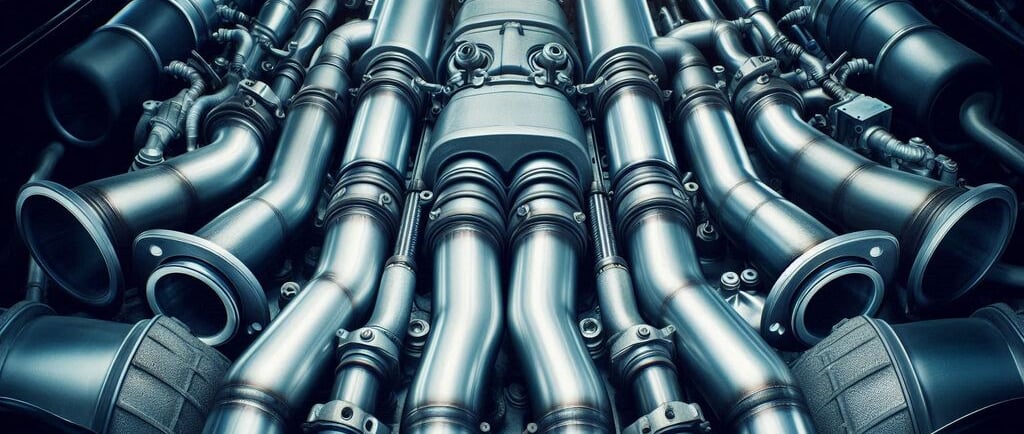Exhaust Pipe: Channels exhaust gases away from the engine.
If you’ve ever wondered how your vehicle keeps running smoothly, one of the critical components involved is the exhaust pipe.
EXHAUST SYSTEMS
11/11/20244 min read


Exhaust Pipe: Channels Exhaust Gases Away from the Engine
If you’ve ever wondered how your vehicle keeps running smoothly, one of the critical components involved is the exhaust pipe. It plays a vital role in directing exhaust gases away from the engine and safely out of your car. But there’s more to the exhaust pipe than just expelling gases—it’s an essential part of your vehicle’s entire exhaust system, contributing to performance, fuel efficiency, and emissions control.
In this article, we’ll dive into the function of the exhaust pipe, its components, common issues, and how to maintain it for optimal performance.
What is the Exhaust Pipe?
The exhaust pipe is a key part of your vehicle’s exhaust system, responsible for channeling exhaust gases away from the engine and out of the vehicle. Without a properly functioning exhaust pipe, harmful gases would build up in your engine, causing your vehicle to run inefficiently and potentially damaging internal components.
How the Exhaust Pipe Works
Exhaust gases are created by the combustion process inside the engine. These gases are made up of harmful chemicals, including carbon monoxide, nitrogen oxide, and hydrocarbons, all of which need to be safely removed from the engine. The exhaust pipe serves as the exit route for these gases, taking them through a series of components, including the catalytic converter and muffler, before releasing them safely into the atmosphere.
The exhaust pipe is connected to the engine and runs along the underside of the vehicle. It’s often made of stainless steel or aluminized steel to resist corrosion and heat damage.
Components of the Exhaust System
The exhaust pipe is just one part of a larger exhaust system that works together to keep your engine running smoothly and cleanly. Here are the key components of the system:
1. Exhaust Manifold
The exhaust manifold collects the exhaust gases from the engine cylinders and channels them into the exhaust pipe. It helps direct the gases towards the catalytic converter for further treatment.
2. Catalytic Converter
The catalytic converter is responsible for reducing harmful emissions by converting toxic gases into less harmful substances. It plays a crucial role in ensuring your vehicle meets environmental regulations.
3. Muffler
The muffler reduces the noise created by the exhaust gases as they exit the engine. It works by using a series of chambers to cancel out sound waves, making your vehicle quieter and more comfortable to drive.
4. Exhaust Pipe
The exhaust pipe channels the gases through the entire system, guiding them safely away from the engine. It can come in various shapes and sizes depending on the vehicle’s design and the type of exhaust system.
Why is the Exhaust Pipe Important?
The exhaust pipe is essential for more than just expelling exhaust gases. It plays a significant role in:
1. Improved Engine Performance
The exhaust pipe helps reduce backpressure, which allows the engine to expel gases efficiently. Backpressure occurs when exhaust gases are forced back into the engine, making it harder for the engine to expel them. This can cause a drop in engine performance and fuel efficiency. A well-maintained exhaust pipe helps avoid excessive backpressure, ensuring your engine runs smoothly.
2. Better Fuel Efficiency
When exhaust gases flow freely through the exhaust pipe and the entire exhaust system, the engine works more efficiently, leading to better fuel efficiency. If there’s any blockage or leak in the exhaust pipe, it can cause the engine to work harder, burning more fuel and lowering your miles per gallon.
3. Emission Control
The exhaust pipe is a critical part of controlling your vehicle's emissions. It directs exhaust gases to the catalytic converter, which reduces harmful pollutants before they are released into the environment. This ensures that your vehicle is environmentally friendly and meets regulatory standards.
Common Exhaust Pipe Issues
Just like any other part of your vehicle, the exhaust pipe can encounter problems over time. Here are a few issues that might arise:
1. Leaks
Exhaust pipe leaks can occur due to rust, corrosion, or physical damage. A leak can reduce the efficiency of the exhaust system, increase noise, and release harmful gases into the vehicle’s cabin.
2. Blockages
Blockages in the exhaust pipe, such as debris or carbon buildup, can prevent exhaust gases from exiting the engine properly. This can cause a significant drop in engine performance, leading to overheating and engine strain.
3. Excessive Corrosion
Exhaust pipes are exposed to extreme temperatures and harsh elements, especially road salt in winter. Over time, this can cause the pipe to rust or corrode, leading to holes or cracks.
4. Misalignment
If the exhaust pipe becomes misaligned, it can cause rattling sounds, inefficient gas flow, and even potential damage to other parts of the exhaust system.
How to Maintain the Exhaust Pipe
Taking care of your exhaust pipe is crucial for keeping your car running smoothly. Here are some tips for proper maintenance:
1. Regular Inspections
Regularly inspect the exhaust pipe for signs of rust, cracks, or loose connections. It’s a good idea to get your exhaust system checked during routine maintenance to catch any issues early.
2. Clean the Exhaust System
Keeping the exhaust pipe clean helps prevent buildup and corrosion. If you live in an area with harsh winters, wash your vehicle’s undercarriage regularly to remove road salt and debris.
3. Watch for Warning Signs
If you notice a decrease in performance, increased engine noise, or strange smells, it’s important to have your exhaust system checked. These are often signs of a problem with the exhaust pipe or another component of the system.
4. Replace Damaged Parts
If your exhaust pipe is cracked, corroded, or leaking, it’s important to replace it as soon as possible to prevent further damage to the exhaust system or engine.
Conclusion
The exhaust pipe is a vital component in your vehicle’s exhaust system, ensuring that exhaust gases are safely directed away from the engine and your vehicle’s cabin. By maintaining a well-functioning exhaust pipe, you can improve engine performance, fuel efficiency, and reduce harmful emissions.
Key Takeaways:
The exhaust pipe channels exhaust gases away from the engine and ensures proper exhaust flow.
Regular inspections and maintenance can help avoid costly repairs and keep your car running efficiently.
If you notice unusual sounds or performance issues, it could be a sign of an exhaust pipe problem that requires immediate attention.
If you’d like to learn more about your vehicle’s exhaust system, check out our articles on [The Role of the Catalytic Converter] and [How to Improve Your Car’s Fuel Efficiency].


